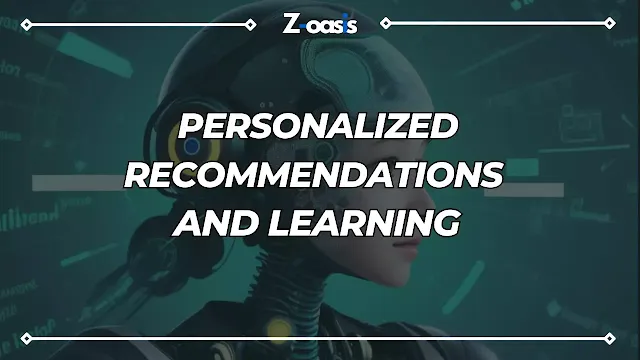Artificial Intelligence (AI) has been a game-changer in the educational landscape, not merely because it's trendy, but due to its ability to make learning experiences more personalized and hence, more impactful. The influence of AI over our learning systems holds substantial promise for students across all age groups and domains.
 |
| Personalized Recommendations and Learning |
A Tailored Approach to Learning with AI
One of the compelling reasons why AI has been warmly embraced by the educational community is its power to tailor learning to individual needs. A typical classroom is packed with diverse learners each with their own pace and style of learning. A generic method of teaching could leave behind students who don't fit the 'one size fits all' approach.
This is where AI steps in, transforming the traditional learning model by incorporating a student's behavior, preferences, and academic performance to prescribe Personalized learning recommendations. With AI's suggestions, students can explore content, tools, and activities designed specifically for them, which ideally suits their style of learning, making the process more effective and efficient.
AI as your Personal Learning Guide
A smart recommendation feature of AI evaluates a student’s performance history, interests, and academic goals, and intelligently guides them in their learning journey. To illustrate, if a concept seems elusive to a student, AI might suggest supplementary material or engaging bite-sized modules to simplify learning. Alternatively, if they are keen on a specific topic, AI could propose further resources or activities to delve deeper into the subject.
With such personalized advice, students get the chance to explore their subjects intricately and attain a sense of self-reliance in their learning process. AI-driven systems can thus boost self-study and active engagement by intuitively understanding and catering to a student's needs and aspirations.
Navigating the Learning Labyrinth with AI
Adaptive learning pathways, shaped by AI, personalize the sequence of learning activities, factoring in a student's progression and grasp of the syllabus. For example, a solid understanding of algebra might prompt the AI to challenge a student with more difficult problems, while struggle with geometry could result in extra practice with various approaches.
These adaptive pathways offer optimal use of learning time and keep students engaged with a balanced mix of challenging and graspable material. By preventing them from feeling either overwhelmed or under-challenged, AI yields better educational outcomes.
Immediate Feedback and Evaluation through AI
Another way that AI upgrades our educational system is by providing instantaneous feedback and assessment. The usual methods of assessment lack immediacy and can create a lag in a student's learning journey, with mistakes often being pointed out days or weeks later.
AI aids by offering immediate, personalized feedback, drawing attention to areas that need improvement, and suggesting ways to master the material. This real-time evaluation can help students adjust their learning strategies promptly, leading to better comprehension and retention of content.
Moreover, AI's analysis of student performance can help identify learning trends, thus giving educators valuable insights into areas needing their focus and intervention. This data-backed approach aids in strategic decision-making in teaching methods, leading to enhanced effectiveness in learning.
Elevating Student Engagement with AI
With AI's personalized recommendations and learning paths, students get far more hooked on their learning journey. Tailoring content and activities to sync with a student's interests makes learning not just engaging but also fun-filled and relevant.
By cleverly leveraging game-like elements such as badges, leaderboards, or creative challenges, AI ensures that learning is not just a task but an exciting adventure. The competitive spirit of games gets students naturally motivated, making the whole process active and immersive.
Add to that, progressive AI technologies like natural language processing and speech recognition usher interactive dialogues with virtual assistants. This creates a dynamic learning experience where students can get their queries resolved, delve into elaborations, and engage in insightful conversations, fostering thorough understanding and active engagement.
To sum it up, AI-driven personalized advice and learning paths can potentially rejuvenate the education sector. Intelligent suggestions, responsive learning paths, instant evaluation, and enhanced involvement driven by AI can significantly boost overall learning efficiency and effectiveness. However, as we lap up these benefits of AI, we must also heed some ethical concerns like privacy and transparency, making sure that AI systems are designed and operated in a manner that respects these principles.